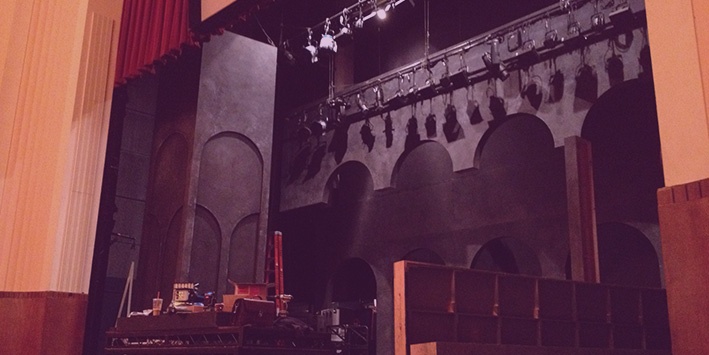
Explaining what I do is always a strange experience. Especially to those who aren’t in the industry. Stage Managers are in charge of so much and coordinate so many aspects of a production. It can be difficult to explain the full spectrum of responsibilities and jobs that they do. I found Broadway stage manager Michael J Passaro’s description best:
“The role [of as stage manager] is really a hybrid of a chief executive officer and chief operating officer in our version of a Fortune 500 company. With those two role models in mind, we’re in charge of setting the tone, atmosphere, and culture for the rehearsal space. There’s also the day-to-day logistics of delivering that show to an audience eight times a week.”
Sound exciting? See yourself making a career in stage management? Wonder what a day in the life looks like (and how much coffee is consumed)? Read on.
PART I – THE SKILLS
1. Organization
This is so basic it almost goes without saying. As you develop and take on more complex roles, good organization is going to need to be instinctual. The good news? You can always train yourself to be better. You don’t have to be a natural. Though it helps. Try out new systems to see what sticks. A great place to start is with non work-related documents. Sort personal files on your computer. Can you come up with an efficient way to bucket everything? Have you made things easy to find? There’s nothing worse than being crunched for time and not able to remember where you put something. To that end, how many places do you store information? Can you streamline?
2. Multitasking
The second of what I call the big three. The best I know are excellent multi-taskers. This doesn’t mean they necessarily split their focus. Merely that they have the ability to recognize multiple needs at the same time and track those needs. Even if an issue arises but needs to be addressed later. Sometimes you are going to be calling cues while simultaneously problem-solving. Suppose you learn a certain element isn’t going to work for the finale but here you are 5 minutes into the show. This is a hard one to train. The most helpful thing I have found is to keep meticulous notes as I work. This way, I can always refer back to my sheets to ensure I don’t miss anything. Especially when seventeen things are happening at the same time.
3. Communication and Working with People
The third leg of the stool. Again, another skill that is a must for successful stage managers. While you will find yourself at times absorbed in your notes, even working alone, the misconception is that the majority of your work is solitary. In reality, your job is more about communication than note taking. You maintain the tone and pace of the rehearsals, tech, and performances. In fact, once a show is open, you are the one who is often primarily responsible for maintaining the director’s aesthetic and vision. Pretty hard to do if you keep your head buried in your calling script.
You don’t have to be the world’s greatest extrovert. But you do need to know how to talk to people. And also how to listen. Anyone can be a boss if the only requirement is to dole out demands. Sleep helps. I’m not kidding. It’s a busy life, whether you are balancing multiple jobs, school, or just in the throes of tech. If you are overtired, your fuse may get a little shorter. You may not actually listen to what people are saying. Nothing does more to damage your rep with a cast than the perception you don’t care about their needs.
4. Adaptability
I know I’m at a relatively early stage in my career. But I’ve yet to work on projects that had the same exact needs. Even paperwork. Every project needs well-documented records of meetings, schedules, call sheets, design reports, etc. But even then, no project or production is going to require, nor conform to the same template. One of my biggest challenges is finding ways to modify paperwork on the fly so as not to lose a step collaborating with the rest of the management team.
With these four skills under your belt, you can tackle any production challenge. But what specifically are the types of things you might have to DO on a daily basis? There are three main components to any production.
PART 2 – THE SPECIFICS
1. Rehearsals – What are you doing?
-
Creating schedules
-
Tracking props, costumes, and scene shifts
-
Communicating changes to designers
-
Running props and scene changes in rehearsals
-
Script tracking and updating
-
Running multiple rehearsal rooms (e.g. choreography in one room and a book scene in another)
2. Tech – What are you doing?
-
Everything you did in rehearsals
-
Building tech schedules (a lot of time and money can be tied up in this responsibility!)
-
Facilitating the safe merging of technical and scenic elements with your cast
3. Performances – What are you doing?
-
Running the show, calling cues, and troubleshooting
-
Understudy and put in rehearsals
-
Managing and facilitating special events and other appearances outside of the normal performance schedule
And this is only a partial list! Here’s an example of how one of your days might look. In truth, it’s one of my days. But yours might be very similar!
Part III – A DAY IN THE LIFE
If I’ve got a show, I always try to wake up 90 minutes before I need to leave. That is, if I have a morning commitment. This gives me more than enough time to get ready for the day, make a cup of coffee, and catch up on emails before I leave. And take on the subway.
If I’m in rehearsals, I like to arrive at least 45 minutes to an hour early. This gives me plenty of time to set up and greet company members as they arrive. It’s an important, though sometimes neglected responsibility to ready the room for the arrival of the creative team. While many may not notice it when it’s done, they will CERTAINLY notice when it isn’t.
More often than not, I will take a short lunch just to make sure I step outside to get some fresh air. And fresh coffee. It’s easy to forget how long you sit in one place during a rehearsal. I use this time to catch up on anything that came up during the first part of the day. When in rehearsal, full attention needs to be on the work at hand. The multi-tasking you need to be doing still needs to be focused on the production, not on things you have going on in the rest of your life.
At the end of the day, I like to stay and send my report before I leave for home. It means that when I leave work, I LEAVE work. Otherwise, my workday continues even after I’ve arrived at home. The time away from work is just as important as the time spent there. I also like to check in with any production team members that may have visited, in case something came up they didn’t have the opportunity to address.
Performance days vary from show to show. Usually, I like to be at the theater at least an hour before the cast is called. And usually a half hour before the crew arrives. This gives me time to focus, enjoy some coffee (noticing a pattern?), see if anyone is out sick, call anyone we may need to put in, and walk through the space. After the show, I could be at the theater anywhere from 15 minutes to an hour, depending on how the performance went and what needs to be documented for the report. All these times vary depending on the productions needs. It’s all about being flexible and adaptable. Except with coffee. No negotiation there.
Being a Stage Manager requires a wide spectrum of abilities and knowledge. It may seem daunting but it is incredibly rewarding, fun, and ever-evolving! If you but you’re not alone! In my last blog, I shared some of my favorite go-to resources. If you’re considering jumping into this field, there are people ready to help. Hope to see you on a show soon!
What kinds of things do you do to be a more effective manager and fulfill the demands of the job? Comment below!
By: Kirk Laing



